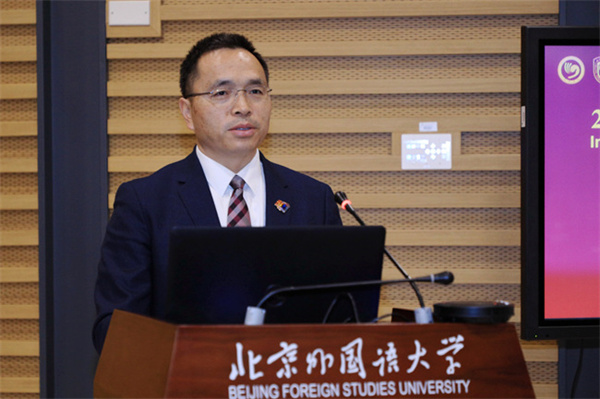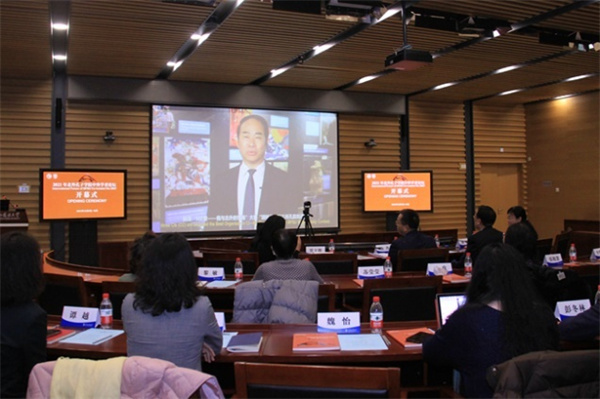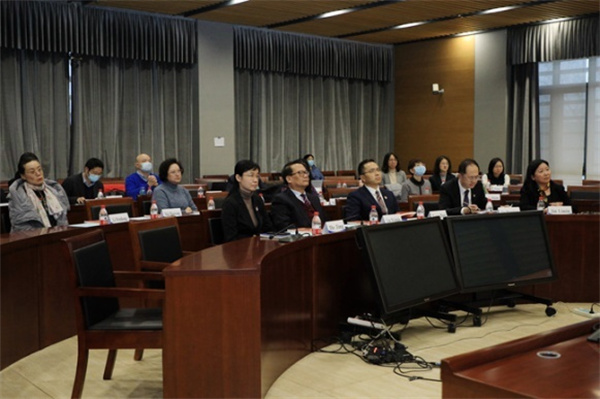- Research
- Research Centers
- Journals
- Admission
- Introduction
- Programs
- Application
- Alumni & Giving
- Alumni Club
- Giving
Focusing on Chinese education and operation of Confucius Institutes, the International Forum of BFSU Co-hosted CIs 2021 was held on Dec 9 to boost high-quality development of international Chinese education in the post-pandemic era.
Hosted by Beijing Foreign Studies University (BFSU) and conducted in an online and offline model, the forum was presided over by Jia Wenjian, deputy secretary of the CPC BFSU committee and vice-president of the university and attended by representatives from renowned universities, including BFSU, Hankuk University of Foreign Studies, Moscow State Linguistic University, Nanjing University, Honghe University, University of Malaya and Maryknoll School.

Yang Dan, president of BFSU, delivers a speech at the International Forum of BFSU Co-hosted CIs 2021on Dec 9. [Photo provided to bfsu.edu.cn]
Yang Dan, deputy secretary of the CPC BFSU committee and president of the university, extended congratulations on the CIs’ outstanding achievements in exploring innovative education models amid the COVID-19 outbreak. He said the university is willing to work with global partners to boost language education, cultural communication and global governance.
According to Yang, Confucius Institutes should enhance their educational influences in an all-around way, innovate Chinese teaching modes, construct Chinese education communities and language education communities, promote civilization communication and mutual learning, improve research capacity and beef up research on global languages, culture and governance.
Kim In-chul, president of HUFS, reviewed the close partnership between the university and BFSU since the establishment of the Confucius Institute and expressed the university’s willingness to play a greater role in education and cultural exchanges between China and South Korea.
Kim said the university will work hand in hand with BFSU, build a world-class foreign language education platform, increase cultural exchanges, strengthen the intensive, characteristic and localized development of its Confucius Institute and deepen the friendship between the two countries.
Shana Tong, president of Maryknoll School and director of the Confucius Classroom, and MiuYulu, director of the Confucius Institute Munich, delivered speeches on behalf of CI presidents.

Wang Dinghua, secretary of the CPC BFSU committee, congratulates CI directors via video link on Dec 9. [Photo provided to bfsu.edu.cn]
Wang Dinghua, secretary of the CPC BFSU committee, congratulated the winners of the “see love: my bonding with BFSU” video and essay competitions as well as the six scholars who won the title of “excellent Chinese CI director” in the 2020-21academic year via video link.
During the forum, representatives of Confucius Institutes discussed the issues on the organization of online activities and the integrated teaching under online and offline modes. Nearly 100 members, directors and former directors participated in the discussions.

Representatives from renowned universities attend the International Forum of BFSU Co-hosted CIs 2021 on Dec 9. [Photo provided to bfsu.edu.cn]
As of November, BFSU has hosted 23 Confucius Institutes and independent classrooms in 18 countries in Asia, Europe and the Americas. Among them, nine institutes were built in countries involved in the Belt and Road Initiative; seven are demonstration institutes; two are culture pilot institutes; one is for academic research; one is for business studies; and one is for publishing studies. Fifteen institutes have been in operation for more than 10 years.
BFSU’s Confucius Institutes have 20 classrooms, 171 Chinese training centers, 487 cooperative institutions and 35,872 students. The number of people who have attended the Chinese proficiency tests totals 9,240.
In 2021, its Confucius Institutes held 194 academic activities, attracting 18,289 attendees and 452 cultural activities with an audience of 101,447 people. In the past year, 42 CI directors, two independent classroom directors, 71 administrative personnel, 263 international Chinese teachers and 75 volunteers participated in the operation of Confucius Institutes.
In the future, BFSU will work with cooperative institutions to innovate language services, cultural exchanges, regional studies and discipline integration, deepen cooperation in language education, strengthen people-to-people bonds, promote the sustainable development of human civilization and continue to contribute to the construction of a community with a shared future for mankind.